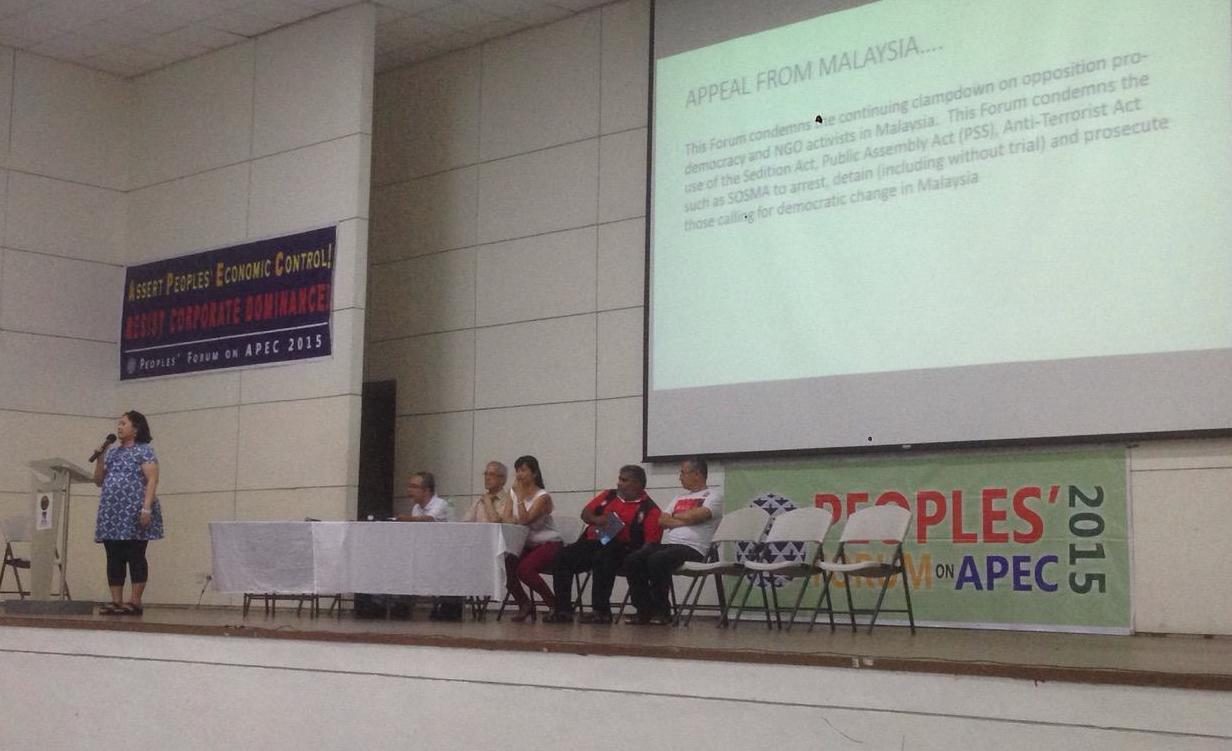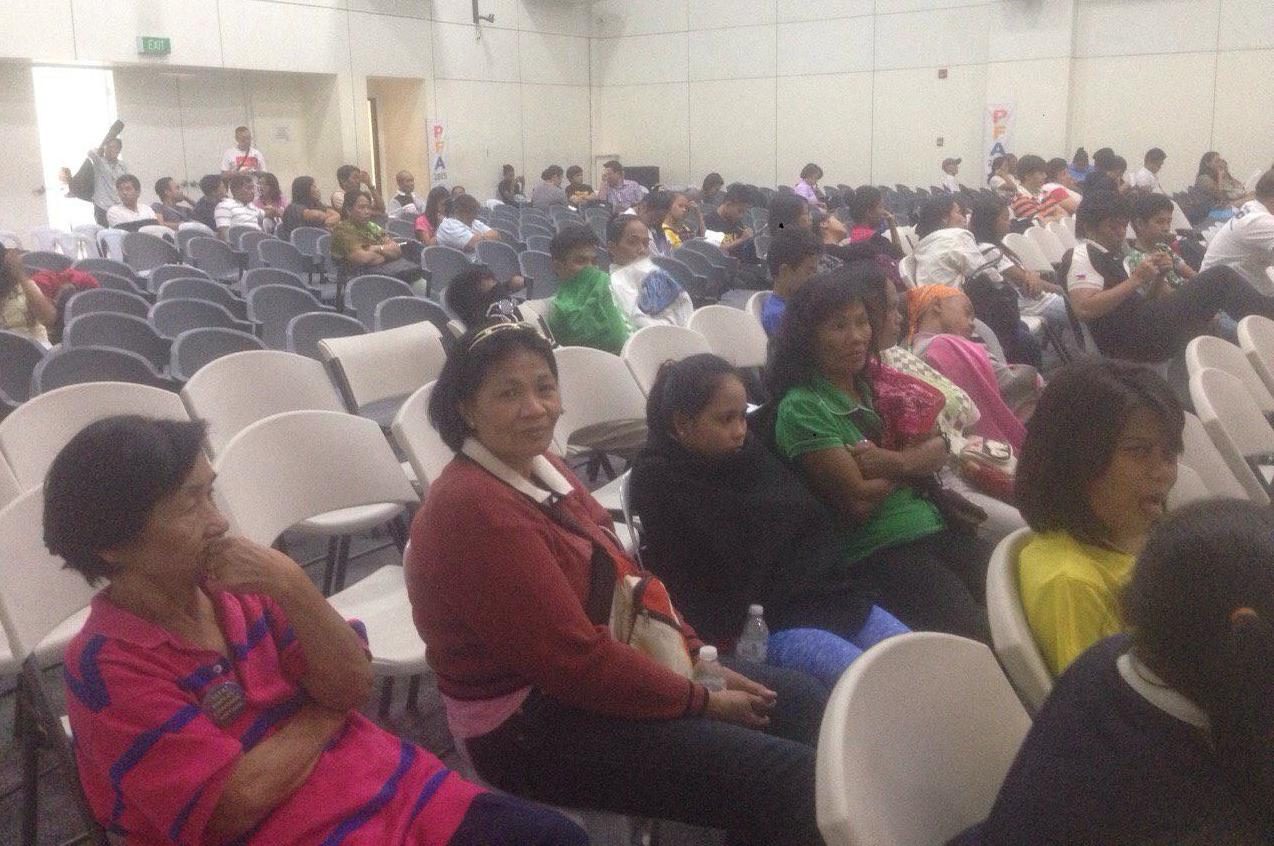SUMMARY
This is AI generated summarization, which may have errors. For context, always refer to the full article.

MANILA, Philippines – As different heads of states arrive for the Asia-Pacific Economic Cooperation (APEC) Leaders’ Summit, experts from various progressive groups on Tuesday, November 17, discussed alternatives to what they call the economic bloc’s “neoliberal, exploitative” agenda.
“APEC really stands for Asia-Pacific Exploiters Club because this is what they’ve been doing since 1989,” Rasty Delizo, People’s Forum on APEC (PFA) secretariat-coordinator, said.
According to Delizo, APEC has 5 pillars that are detrimental to the public – Privatization, Liberalization, Deregulation, Contractualization and Public-Private partnerships.
The issues highlighted in the forum included food security, women and gender, human security, and financial markets, among others.
APEC is the highest-level, most influential economic forum in the Asia-Pacific. With 21 member economies, it accounts for nearly half of world trade, and about 57% of global gross domestic product (GDP). Founded in 1989, it aims to promote free and open trade and investment. (READ: APEC what? An explainer on Manila’s high-profile week)
‘APEC bad for farmers’
Romy Royandoyan of Centro Saka Inc said there is an impending food crisis in the country and this is worsened by APEC’s thrusts.
“When we talk about food security, it mainly revolves around rice. The question is: is our rice industry sustainable beyond 2017?” he said.
According to Royandoyan, the World Trade Organization (WTO) guaranteed a quantitative restriction on rice until 2017. This means the Philippine government controls the import on rice. This is already the 3rd extension the WTO granted to the country.
He added that the end of the extension will bring 3 major problems for the rice industry:
- Rice smugglers will thrive because all they have to do is to pay Customs duties
- Farmers will be unable to compete with the low price of production in other countries
- Policy will shift from food self-sufficiency to rice importation
“Can our farmers compete with cheap imported rice by 2017? No,” Royandoyan said.
The introduction of new machinery is also another problem. In Central Luzon, Royandoyan noted that 18 out of 20 farmers were laid off when rice companies bought new machinery. (READ: Rice price hike, ‘job misery’ causes of hunger in PH)
“Don’t take out restrictions until we fix our rice industry. That’s the simple alternative,” he added.
Arze Glipo, Executive Director of Integrated Rural Development Foundation, also proposed alternatives against the APEC agenda for the rice industry.
“We need to push for the people’s food sovereignty. The masses should control and decide on what we plant. It should not be dictated by APEC and other international regimes,” she said.
Glipo added that the current policies of the Department of Agriculture (DA) are heavily influenced by various aid agencies controlled by the West.
“We need to dismantle policies that are dictated by foreign bodies. Policies should come from the people and not from governments controlled by capitalists,” she said.
Real vs finance economy

While APEC pushes for stronger financial institutions and economies, Mae Buenaventura of the Freedom from Debt Coalition said we need to ask these questions: To whose benefit and advantage? Why do they want it to be stronger?
Buenaventura said the problem with APEC is that it is based on finance economy and not real economy. Real economy is where real products are made out of industries while finance economy is based on profits and stock markets.
“Finance capital has dominated the real economy. It brought about more instability and vulnerability. In this environment, more employers get concerned with their labor costs. In effect, employees get lower salaries and more work to do,” she said.
Buenaventura cited 5 alternatives to make our economy work for the poor:
- Finance capital and the financial system should be based in and serve the real economy – production – and social reproduction.
- Financial institutions should be regulated and subject to strict control and public accountability. All aspects of banks’ operations should be regulated and public controlled in line with the above principles.
- The financial system, finance flows and financial translations and processes should not lead to or reinforce exploitation and other labor issues.
- Financial system must support and contribute to the development of the domestic capacity of economies.
- Public scrutiny of financial institutions and activities should be based on the above principles.
Human security
For Pablo Rosales of the Kilusan para sa Pambansang Demokrasya, the APEC is clouded by crises and wars that can be blamed on major economic and global powers like the US, Russia, Japan, China, and Australia.
“The 2015 APEC Leaders’ Summit is a monument to more dysfunctional multilateral mechanics for global progress and peace. The Filipino people have to bear the burden of hositng the summit, which is an area for big power rivalry,” Rosales said.
He also commented on how the Trans-Pacific Partnership (TPP), which he believed would be pushed during the APEC summit, would only further US and Japanese monopolies.
“TPP would make labor more flexible and deregulated, especially on wages and job security. It opens wider gates for trade in services, which is mainly the traffic of skilled labor and professionals,” he added.
“Genuine international progress and peace rely on the solidarity and struggle of the world’s peoples against the moribund, decadent, and predatory global capitalism,” he stressed.
Most of the groups present in the forum are planning to hold protests on November 18 and 19, when the heads of states will discuss economic and trade policies. – Rappler.com
Add a comment
How does this make you feel?
There are no comments yet. Add your comment to start the conversation.